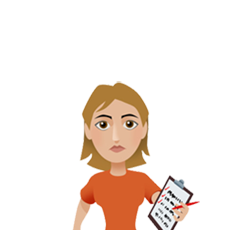Holiday Routine: The Gift that Keeps on Giving

Ever play Jenga? You build a tower of wooden blocks, and then players take turns removing one block from the middle and putting it on top. Eventually, someone removes the one that makes it all topple over. That, in a nutshell, is ADHD kids and school vacation! Want to play – and win?!
Keeping Your Structure from Collapsing
Since the start of school, you've probably been working hard to implement a structure to get your kids get from pillow to bus on time. You make sure that they have a system to do their homework - and remember to return it to school, for example. These routines establish stability and predictability, helping them to manage their impulsivity and emotions in an otherwise hectic world. Think of routine and structure as the infrastructure that holds all of your Jenga blocks together.
When the holidays come, not having school removes a block. Stress from various social activities removes a block. Hyper-focus on a particular gift, worry about not receiving said gift, too much unstructured time, and, perhaps, harried parents, all remove blocks until you're left with a teetering tower full of holes. And just after you've finally succeeded (more or less!) in settling them into a routine during the school season!
To keep your kid from toppling over emotionally, making bad choices, and taking you down with her, you can build structure into the "holes" that happen during the holidays by creating a holiday routine.
Article continues below...
Want to Motivate Kids?
Download a free tipsheet "The Parent's Guide to Motivating Your Complex Kid" to help your child find the motivation to do... anything and everything!
How to Build in Structure?
One biggie is making sure your kid wakes up at a consistent time. It doesn't have to be the same time that they get up for school. For example, if they usually wake at 6:30, maybe they sleep in until 9:00. But have them set an alarm, or be the alarm for them, so they're up and moving on some type of schedule.
This is critical for kids who take medicine because they typically need their medication at the same time every day (for the physiological effects and also to reinforce the habit). If they sleep in, they might take the medication late, which makes it more difficult for them to digest. This may interfere with their appetite or keep them up later at night. Which makes them sleep later the next morning, and the cycle begins again.
Traditions: Holiday Routines Can – and Should – Be Fun!
For many of us, the holidays are tradition. We serve the same special foods and put up decorations that have been passed down from generation to generation, along with ornaments that our kids made themselves. They're important to everyone, but because our kids do much better when life is more predictable, traditions can be a particularly great way to add structure to vacation time.
When I was growing up, we had a tradition (aka a rule!) that we had to stay upstairs and wait until a grown-up went downstairs to see if Santa had come. When we got the all-clear, we'd rush down. I continued this tradition with my own kids.
My dad started this because...well, I could say it was because he had an understanding of structures and systems that was ahead of its time. But no – it was because he needed a morning coffee! He needed to go downstairs and have a cup before dealing with kid chaos, torn wrapping paper, and squeals.
I can thank caffeine for this great tradition! To this day, my kids – who are teenagers – sit at the top of the stairs and wait for an adult to see if Santa's come. Now, they know jolly old St. Nick may have been replaced by tired mom in her pajamas, but it's fun! They're excited, and, at the same time, they have a holiday routine that helps them manage their impulses.
While kids may not admit it, they need the structure that school provides. When they're on vacation, keep them from tumbling over by implementing systems that help you maintain some sort of consistent schedule. (And save room for fun and togetherness!)


